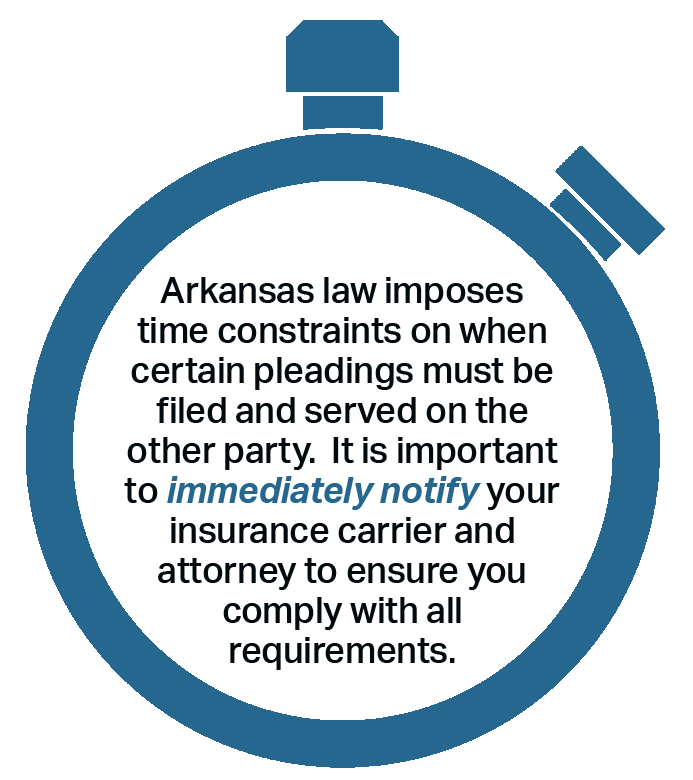Med Mal 101: Back to Basics is 12-part series produced by Friday, Eldredge & Clark. Written by the attorneys in the Medical Malpractice Group, the content is designed to give physicians and other healthcare providers information they need to know about malpractice litigation.

In Part 1 of Med Mal 101, we identified the parties and legal pleadings required to initiate a lawsuit. In this article, we will address what happens when a medical care provider is served with notice of a lawsuit.
The first thing to keep in mind is that actions for medical injury typically must be filed within two years from the date of the alleged negligent act. Ark. Code Ann. § 16-114-203(a). There are limited exceptions when the case involves a foreign object left in the body or where the patient was a child, for example. In those cases, the statute of limitations period may be longer.

Most cases are filed in state court. Once a lawsuit is filed, the person bringing the lawsuit ("plaintiff") is required to provide formal notice of the case to all persons who are being sued ("defendants"). Unless there is a special circumstance that requires an extension of time, the plaintiff must serve a copy of the summons and complaint on each defendant within 120 days of the case being filed in court. Ark. R. Civ. P. 4(i). If the plaintiff fails to complete service within the 120-day period, the action should be dismissed. The rules differ somewhat in federal court, so it is important to discuss the jurisdictional rules with your lawyer.
In order to satisfy due process, there are very particular requirements regarding how a person can be summoned to court. For this reason, medical care providers who are served with court papers should take careful note of how, when and exactly what papers they receive in connection with a case so that their lawyers can make sure that their rights as defendants are respected.
Assuming a defendant is properly served with the lawsuit, the defendant must file a written answer to the complaint. An answer is a detailed legal document that will require the help of a lawyer, so it is important to obtain counsel immediately upon notice of suit. Typically, the defendant must file an answer within 30 days from service of the summons and complaint. Ark. R. Civ. P. 4. If a defendant does not timely answer, judgment by default may be entered against her or him, which may be treated as a failure to defend. Therefore, it is critical for a defendant to timely respond to a complaint.
A defendant is required to work carefully with his or her lawyer to draft the answer to the complaint. Complaints must identify the claims made and specify facts upon which, if true, relief can be granted under Arkansas law. The defendant must answer each specific allegation in the complaint to the best of his or her knowledge. Any allegations in the plaintiff’s complaint that are not denied in the defendant’s answer are deemed admitted. Ark. R. Civ. P. 8(c). Accordingly, it is crucial for a defendant to respond accurately to each allegation listed in the plaintiff’s complaint. If a defendant is without knowledge or information sufficient to form a belief as to the truth of an allegation, he must state so, and it will have the effect of a denial. Ark. R. Civ. P. 8(b).
A defendant must also set forth any available affirmative defenses in his answer or they can be waived. An affirmative defense is an assertion of facts or legal defenses that may defeat the plaintiff’s claim, such as a violation of the statute of limitations, which was discussed earlier in this article.
Properly responding to a plaintiff’s complaint is one of the most important parts of defending a case and can also be one of the most challenging. It is important for medical care providers to immediately notify their insurance carriers and attorneys when they receive a complaint so that their answer meets all of the requirements.
The information was written by the attorneys in the Medical Malpractice Group at Friday, Eldredge & Clark, LLP. This is not a substitute for legal advice and should be considered for general guidance only. For more information or if you have further questions, please contact one of our Medical Malpractice Attorneys.
The 12-month series will include the following topics:
- Part 1: How a Lawsuit Gets Started - Jan. 2019
- Part 2: Responding to a Complaint - Feb. 2019
- What is the Legal “Standard of Care” in Arkansas?
- What is Considered Malpractice Under the Law?
- What Happens If There is a Bad Outcome That Could Not Be Avoided?
- What is a Medical Injury?
- You Received A Subpoena ...Now What?
- Information That is Shared About a Provider During a Lawsuit
- Depositions - What to Expect
- Motions, Settlements and Trial
- What to Expect at Trial
- The Appeals Process